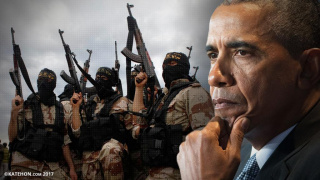ISIS is in the Balkans
Accumulating evidence persuasively shows that the success of the Russian coalition’s military campaign in Syria is contributing to a shift of Islamic State’s manpower and resources to other operational areas, most notably the Balkans. Their Balkan ambitions are reflected in the attached map, but have been evident in their rhetoric and field preparations for quite some time.
The fact that ISIS is not just willing but also able to make good on its designs was illustrated recently in the form of a bomb attack on General Anto Jeleč, chief of staff of the armed forces of Bosnia and Herzegovina.
Significantly, on November 13, 2015, General Jeleč made an announcement that probably caused him to become a target of the terrorists. He stated that later that week, pursuant to the decision taken by Bosnia’s government Presidency, “Bosnia and Herzegovina would begin delivery of 550 tons of ammunition it is donating to Iraq to help it in its war against the Islamic State terrorist organization.” The Iraq-bound contingent consisted of 15 million 7.9 mm and 400,000 14.5 mm surplus bullets in the Bosnian army’s arsenal.
Security expert Predrag Ćeranić from Banja Luka, Republic of Srpska, one of Bosnia’s two ethnically-based autonomous entities, states that “indications are clear that the Islamic State has decided to punish Bosnia for the authorities’ decision to send military assistance to its opponents.” He adds, ominously, that there is a growing awareness in Bosnia that the country, because of its unique characteristics and problems has been made a particular target by ISIS.
This and a number of other violent incidents in the region with demonstrable ISIS roots suggest that the Islamic State has a broad agenda for the Balkans. The basic goal is to time and calibrate terrorist attacks in such a way as to promote a new eruption of ethnic and religious conflict between Muslim and Orthodox ethnicities. Incidents in other areas, adds Prof. Ćeranić, show that notwithstanding setbacks ISIS has a continued capacity for self-regeneration, enabling it to make its presence felt at virtually any point on the planet where it has managed, as a result of successful indoctrination, to gain new adherents.
A particularly worrisome issue is how Islamic State operatives are planning to utilize the migrant crisis for their nefarious purposes. But there is no doubt, in the view of Ćeranić and other security experts in the region, that specially trained ISIS psy-op and black operation cadres are already in place to make the best of the convenient presence in Balkan countries of tens of thousand of able-bodies military age Middle Eastern males, geographically stuck and disgruntled that their trek toward a fairy-tale future, which they were led to believe awaited them in Germany, is encountering increasing obstacles.
The expectation is that in the Balkans they will organize strike forces, including the collaboration of local sympathizers, that would commit terrorist acts and then quickly withdraw into inaccessible forests and mountains. Some form of guerrilla warfare would follow and be ignited in order to destabilize the region. According to intelligence and security specialists, operations are expected to be concentrated in areas where the terrain and ethnic tensions are propicious: Bosnia, Kosovo, Macedonia, and southern Serbia.
“Terrorist attacks are always carried out in order to cause insecurity, incite fear, and disorient the population,” Prof. Ćeranić points out, and adds that the Islamic State’s goal is to cause a conflagration in the Balkans and create an enclave in the area that straddles eastern Bosnia and the Raška district in Serbia.
The extremely disquieting implications of this expert’s analysis are tempered by his assertion that the one thing Islamic State operatives fear is provoking in Serbia a Russian involvement along Syrian lines. At Serbia’s invitation Russia could, using airports located in Batajnica or Niš, move in two or more wings of multi-purpose military aircraft, airborne troops and required logistics to assist local anti-terrorist forces.
ISIS leadership keenly appreciate that for the Russian armed forces,after their experience in Syria, that would be a practically routine operation.





